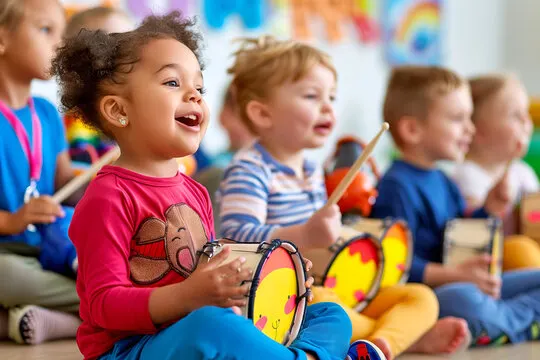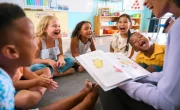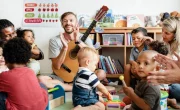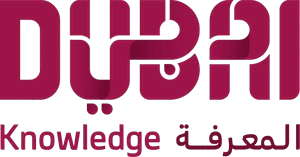Music, Art, And Movement: Holistic Development Activities For Preschoolers
In today’s fast-paced world of worksheets, flashcards, and school interviews, it’s easy to lose sight of what really matters during the early years of childhood. For preschoolers, real learning isn’t just about ABCs and 123s. It’s about play. It’s about joy. And it’s about building a strong foundation across mind, body, and emotions.
That’s why holistic development activities — especially those involving music, art, and movement — are some of the most powerful tools you can use as a parent. These activities not only make learning fun, but they also help nurture creativity, memory, emotional intelligence, and physical coordination — all at once.
Let’s explore how music, art, and movement can support your child’s growth and how you can easily incorporate activities for holistic development at home.
Why Music, Art, And Movement Matter For Holistic Development
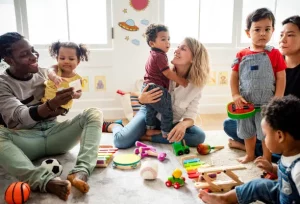
Preschoolers are at a stage where their brains are developing faster than at any other point in life. These early years are critical for forming neural connections that support future learning, emotional resilience, social intelligence, and physical skills.
Engaging in holistic development activities like music, art, and movement: Stimulates both the left (logical) and right (creative) hemispheres of the brain Enhances focus, memory, and emotional regulation. Encourages communication, confidence, and problem-solving
Instead of compartmentalizing learning into rigid academic categories, these multisensory activities allow children to experience the world more fully — with their hands, hearts, and whole bodies.
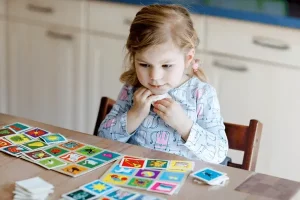
Music: Building Memory, Focus, And Emotional Growth
You don’t need to be a musician to tap into the magic of music. Singing a lullaby, clapping to a beat, or humming a familiar tune all have powerful effects on the brain.
Research has shown a deep link between music and brain development in children, especially in the early years when cognitive development in early childhood is at its peak. Here’s how:
- Memory: Musical rhythm and repetition help children absorb and retain new information more effectively.
- Language Skills: Singing and rhyming build vocabulary, phonemic awareness, and verbal expression.
- Focus and Attention: Songs with patterns and rhythms improve concentration.
- Emotional Expression: Music provides a safe outlet for children to process and express feelings, helping with self-regulation and empathy.
In fact, many right-brain education approaches intentionally use music to enhance long-term memory, increase visualisation capacity, and stimulate emotional connectivity — all of which are vital in early childhood brain development. Music and brain development in children go hand in hand in shaping emotional resilience.
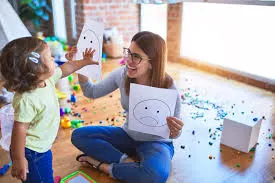
Art: Fostering Creativity And Fine Motor Skills
Children often express what they can’t say with words through art. Scribbles, finger painting, and clay work are more than just messy play — they’re key forms of communication and imagination.
Here’s why art activities for preschoolers are essential:
- Fine Motor Development: Painting, coloring, cutting, and pasting help strengthen finger muscles and improve hand-eye coordination.
- Spatial Awareness: Working with different shapes and sizes boosts understanding of space and patterns.
- Emotional Expression: Art allows children to work through emotions and tell stories without words.
- Creativity and Innovation: Open-ended art tasks encourage divergent thinking — the ability to see multiple possibilities and solutions.
Importantly, when children engage in art without being told “what it should look like,” they learn that the process matters more than the outcome — a critical mindset for lifelong learning. Art activities for preschoolers support cognitive development in early childhood by fostering curiosity and imagination.
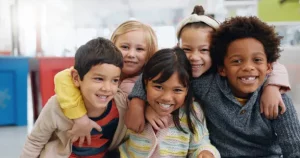
Movement: Connecting Mind And Body
Movement isn’t just about running around and burning energy. It’s deeply tied to brain development, especially during the preschool years.
There’s growing research connecting dance and brain development, showing how movement:
- Strengthens gross motor skills (balance, coordination, posture, core strength)
- Enhances executive functions such as working memory, attention control, and cognitive flexibility
- Supports emotional regulation, confidence, and resilience
Yoga for kids, creative movement games, and even free dance play contribute to emotional and neurological integration. These activities also reduce anxiety and improve mood — especially when practiced regularly. Dance and brain development go beyond physical benefits to support emotional and mental growth.
Whether your child is jumping to music, balancing on a line of pillows, or mimicking animal movements, they’re engaging in holistic development activities that boost both physical and mental well-being.
Easy Music, Art, And Movement Activities For Preschoolers
The best part? You don’t need expensive tools or structured classes to get started. Many activities for holistic development at home are simple, screen-free, and accessible — and they build lasting skills through everyday play.
Music Activities:
- Sing-Alongs: Use songs with gestures (“Head, Shoulders, Knees, and Toes”) to link language with movement.
- Rhythm Games: Clap patterns and have your child repeat them — it builds auditory memory and sequencing skills.
- Instrument Play: Use pots, spoons, or shakers to explore rhythm and volume. Music and brain development in children can be stimulated even with everyday items.
Art Activities:
- Finger Painting: Great for sensory exploration and muscle control.
- Collage Making: Let your child cut, tear, and glue magazine pieces onto paper — no rules, just creation.
- Nature Art: Gather leaves, twigs, or flowers during a walk and make a creative piece at home. These art activities for preschoolers are simple, yet powerful.
Movement Activities:
- Yoga for Kids: Try animal poses (cat, cow, cobra) with deep breathing to calm and energize.
- Creative Movement Games: Dance to music and freeze when it stops, or act out animals in a jungle.
- Obstacle Courses: Use cushions, chairs, and blankets to set up a physical adventure at home. These activities align beautifully with research on dance and brain development.
By incorporating just a few of these every week, you’re actively supporting music and brain development in children, strengthening fine motor skills through art, and laying the neurological foundation supported by dance and brain development research. These are easy and effective activities for holistic development at home.
How Parents Can Support Holistic Growth?
You don’t need to follow a perfect plan or schedule. What matters most is consistency, joy, and intention.
To incorporate holistic development activities in your child’s life:
- Prioritize Play: Make time for free, unstructured, sensory-rich play every day.
- Mix Modalities: Blend music, art, and movement instead of treating them as separate subjects.
- Be Present: Join your child in these experiences. Your engagement builds connection and confidence.
Use Structured Support: Tickle Right, our fun-filled right-brain development program, uses music, movement, storytelling, and art to promote whole-brain learning.
We believe in honoring every child’s potential by nurturing their entire being, not just their academic performance. That’s why our sessions are built around storytelling, movement, art, music, and memory — because cognitive development in early childhood is most powerful when it’s joyful and multi-sensorial. Art activities for preschoolers, music and brain development in children, and dance and brain development all come together to support holistic growth.
So whether you’re painting side by side, dancing in your living room, or singing together in the car, you’re doing something incredible. You’re shaping neural pathways. You’re helping your child understand. And most of all, you’re creating memories rooted in love, curiosity, and growth.
Ready To Explore More? If you’re looking to take the next step beyond home activities, explore how Tickle Right can support your child’s journey with a joyful approach to holistic development activities. Register for a free orientation at a centre near you today! These activities for holistic development at home can be your child’s stepping stone to cognitive development in early childhood.

